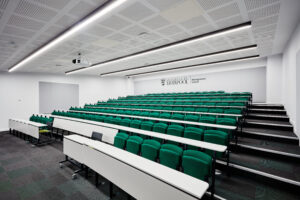Business Economics with a Year in Industry
UCAS code LN12
- Study mode
- Full-time
- Duration
- 4 years
- Start date and application deadlines
-
- Start date
UCAS code LN12
It is an exciting time to join us, our Economics programmes are ranked 11th from 71 providers (a rise of 7 places on last year) for Times Good University Guide 2025. We are now in the top 10 in the 2025 Guardian University Guide and we outperformed the sector benchmarks for all 7 question themes in NSS 2024.
*based on subject area.
Studying Business Economics with a Year in Industry BA at Liverpool will develop your quantitative and analytical skills in addition to broadening your business knowledge.
Throughout your time at Liverpool, our Business Economics with a Year in Industry BA programme will help you develop much sought after analytical skills that you’ll be able to use in many different business settings as you will have the opportunity to gain experience using real-time trading information, economic and financial news in our Bloomberg Trading Floor.
From your first year of studying right up until your last, you will cover the main principles of business and depending on your chosen pathway, Accounting and Finance or International Business, you will also study the key areas of economics to understand and put into a business context, discover its role within business, the UK and the wider global economy.
The University of Liverpool Management School holds accreditation from AACSB, AMBA and EQUIS. This makes it one of an elite group of institutions worldwide to hold the gold standard triple accreditation.
Through excellent teaching and quality content, this course is accredited by the Institute of Chartered Accountants in England and Wales (ICAEW), the Association of Chartered Certified Accountants (ACCA) and the Chartered Institute of Management Accountants (CIMA).

In aligning our Accounting and Finance programme with the Association of Chartered Certified Accountants (ACCA), our students are eligible for exemptions from specific ACCA exams up to the Strategic Professional Level papers. This will fast-track their journey to membership once they graduate – so they can start their careers in finance and accountancy more quickly.

This programme is accredited by Chartered Institute of Management Accountants (CIMA) which will give you further skills and understanding on how businesses operate, are managed, how to create strategies and how people work together.

The Institute of Chartered Accountants in England and Wales (ICAEW) works with the University of Liverpool to grant credit for prior learning (also known as exemptions) for relevant content covered in undergraduate and postgraduate degrees.
Once you have finished your degree you will only have to complete any outstanding modules, the compulsory practical work experience element of the ACA and demonstrate your ethical and professional development, to qualify as an ICAEW Chartered Accountant.

We’re proud to announce we’ve been awarded a Gold rating for educational excellence.
Discover what you'll learn, what you'll study, and how you'll be taught and assessed.
Your first year at Liverpool will introduce you to the subjects that provide the foundation for an economic study of business. Upon commencing the programme you will take a combination of core modules and optional modules determined by your chosen pathway: Accounting and Finance or International Business.
Both pathways have a number of compulsory modules that must be completed in addition to optional modules.
Those on the Accounting and Finance pathway are required to take the core module ACFI101 and may choose either ACFI102 (available on this pathway only) or ACFI103. ECON159 is not available on this pathway.
Those on the International Business pathway have no optional modules in year one, students must take ACFI103 and ECON159.
| Optional modules | Credits |
|---|---|
| INTRODUCTION TO FINANCE (ACFI103) | 15 |
| INTRODUCTION TO MANAGEMENT ACCOUNTING (ACFI102) | 15 |
Programme details and modules listed are illustrative only and subject to change.
In your second year of study, you will start to build upon the foundations you created in your first year to start to deepen your understanding of economics and business with six core Business Economics related modules including International Management, Introductory Econometrics for Business and Economics and Management Economics. These core modules are also alongside two modules from your chosen pathway.
In year two, those on the Accounting and Finance pathway must complete the compulsory modules listed and may choose either ACFI201 or ACFI204 in semester 1 and ACFI202 or ACFI203 in semester 2. MKIB261 is not available on this pathway.
Those on the International Business pathway must take ACFI204 and MKIB261.
| Optional modules | Credits |
|---|---|
| FINANCIAL MANAGEMENT (ACFI204) | 15 |
| FINANCIAL REPORTING 1 (ACFI201) | 15 |
| ACCOUNTING THEORY (ACFI202) | 15 |
| MANAGEMENT ACCOUNTING (ACFI203) | 15 |
Programme details and modules listed are illustrative only and subject to change.
The third year of your programme is spent on placement. You will complete a year-long graduate-level placement, providing valuable work experience and an opportunity to further enhance the skills and attributes sought after by top employers.
You can apply for UK-based placements with a large organisation or smaller company or even seek a placement overseas. You will be visited at least twice by University staff whilst on placement with support from the Placement Team throughout and complete related assessments in May.
Further information about the year in industry is available on the Management School website.
| Compulsory modules | Credits |
|---|---|
| ULMS PLACEMENT YEAR (ULMS299) | 120 |
Programme details and modules listed are illustrative only and subject to change.
Your final year enables you to apply the theoretical knowledge you’ve gathered in your previous studies and apply it to specific business scenarios as well considering economy theory in relation to contemporary issues. With more optional modules to choose from you are able to pursue areas of study of particular interest to you and your future career plans.
In year four, both pathways must complete ECON355 and ECON333.
The following optional modules are available on the Accounting and Finance pathway only; ACFI303, ACFI309, ACFI302, ACFI320, ACFI322.
The following optional modules are available on the International Business pathway only; MKIB369, MKIB351, ULMS370.
| Compulsory modules | Credits |
|---|---|
| INDUSTRIAL ORGANISATION (ECON333) | 15 |
| DEBATES IN MACROECONOMIC POLICY (ECON355) | 15 |
Programme details and modules listed are illustrative only and subject to change.
Modules are taught using the latest active learning techniques including business simulations, real-world case studies, social media, interactive participation software, lecture capture and real-time financial and business data using our Bloomberg Trading Floor. The principal forms of teaching are lectures and seminars with lectures normally being supported by material such as hand-outs and presentations.
Seminars give the opportunity for detailed discussion of a topic under the direction of a tutor. You are normally expected to prepare work in advance for seminars and may be expected to present work or give presentations from time to time. On some modules, such as quantitative techniques and IT, seminars may take the form of practical sessions using our PC suites.
All our degrees depend on you spending a good part of the week in private or group study in preparation for lectures and seminars. This involves making extensive use of the excellent library and IT facilities, just one minute’s walk away from the Management School.
You will be assessed through a combination of coursework and examinations. The exact weighting will vary from one module to another. As well as individual assignments and exams, you may also be assessed on group reports and presentations.
We have a distinctive approach to education, the Liverpool Curriculum Framework, which focuses on research-connected teaching, active learning, and authentic assessment to ensure our students graduate as digitally fluent and confident global citizens.
The Liverpool Curriculum framework sets out our distinctive approach to education. Our teaching staff support our students to develop academic knowledge, skills, and understanding alongside our graduate attributes:
Our curriculum is characterised by the three Liverpool Hallmarks:
All this is underpinned by our core value of inclusivity and commitment to providing a curriculum that is accessible to all students.
The qualifications and exam results you'll need to apply for this course.
| Qualification | Details |
|---|---|
| A levels |
BBB |
| GCSE |
GCSE Mathematics at grade 7/A and GCSE English at grade 4/C required. |
| BTEC Level 3 national extended diploma |
DDD in a Business related subject plus grade B at A level. Business Related BTEC are:: Applied Law; Applied Psychology; Business, Accounting & Finance; Computing, Creative Media Production; Engineering, Enterprise & Entrepreneurship; Health & Social Care; Hospitality; ICT; IT; Media; Public Services; Strategic Management & Leadership; Travel and Tourism. |
| BTEC combinations |
BTEC National Diploma DD in a Business related subject plus grade B in an A Level BTEC National Extended Certificate D plus BB at A level. Business Related BTEC are:: Applied Law; Applied Psychology; Business, Accounting & Finance; Computing, Creative Media Production; Engineering, Enterprise & Entrepreneurship; Health & Social Care; Hospitality; ICT; IT; Media; Public Services; Strategic Management & Leadership; Travel and Tourism. |
| Welsh Baccalaureate Advanced |
B in the Welsh Baccalaureate, plus BB at A level. |
| Access |
Pass relevant Access to HE Diploma with 45 Level 3 credits with 30 at Distinction and 15 at Merit. |
Studying with us means you can tailor your degree to suit you. Here's what is available on this course.
University of Liverpool students can choose from an exciting range of study placements at partner universities worldwide.
Immerse yourself in Chinese culture on an optional additional year at Xi'an Jiaotong Liverpool University in stunning Suzhou.
Take a semester of your second year of study at one of our worldwide partner institutions.
Spend a summer abroad on a study placement or research project at one of our worldwide partner institutions.
This course is also available without an included year in industry.
View Business Economics BA (Hons)
To spend a year in industry, you'll need to secure a placement with an organisation. If you're unable to find a placement, you'll continue with the standard version of the course without a year in industry.
Every student at The University of Liverpool can study a language as part of, or alongside their degree. You can choose:
Day-to-day teaching will take place in the University of Liverpool Management School; a world leading centre for management and leadership education and research and is one of an elite group of institutions worldwide to hold the gold standard ‘triple-crown’ accreditation. At the Management School, students have access to careers education, opportunities to work as well as excellent library and IT facilities, just one minute’s walk away.






From arrival to alumni, we’re with you all the way:

I think Liverpool is one of the best cities to study and live in. There are lots of shops, independent restaurants, exciting nightlife, a variety of concerts and music nights, sporting events, museums and some beautiful parks.

Want to find out more about student life?
Chat with our student ambassadors and ask any questions you have.
Studying Business Economics with a Year in Industry at the Management School not only develops specific quantitative and analytical skills but a broader business knowledge from studying both business and economics. Studying Business Economics at the Management School will provide you with the skills to work in finance, accountancy and government administration.
Many former students find successful careers in many professions such as:
You will be encouraged to undertake a Year in Industry as part of the four-year sandwich degree programme.
Recent employers for the previously mentioned professions include:
You can also explore taught postgraduate opportunities in our management school including:
4 in 5 business and management students find their main activity after graduation meaningful.
(Graduate Outcomes, 2018-19.)
Your tuition fee covers almost everything, but you may have additional study costs to consider, such as books, specialist equipment or field trips.
Full-time place, per year - £9,535
Year in industry fee - £1,905
Full-time place, per year - £25,000
Year in industry fee - £1,905
The tuition fees shown are correct for 2025/26 entry. Please note that the year abroad fee also applies to the year in China.
Tuition fees cover the cost of your teaching and assessment, operating facilities such as libraries, IT equipment, and access to academic and personal support. Learn more about paying for your studies.
All students have the opportunity to spend a semester studying overseas during their second year, subject to your year one performance. If you elect to study abroad you will need to cover associated travel and living costs. University travel bursaries and subsistence grants are available.
Find out more about the additional study costs that may apply to this course.
We offer a range of scholarships and bursaries that could help pay your tuition and living expenses.
If you’re a UK student joining an undergraduate degree and have a household income below £35,000, you could be eligible for a Liverpool Bursary worth up to £2,000 for each year of undergraduate study.
Apply for an Asylum Seekers Scholarship and you could have your tuition fees paid in full and receive help with study costs. You’ll need to have applied for asylum in the UK, or be the dependant of an asylum seeker, and be joining an eligible undergraduate degree.
If you’ve spent 13 or more weeks in Local Authority care since age 14, you could be eligible for a bursary of £3,000 per year of study. You’ll need to be a UK student joining an eligible undergraduate degree and be aged 28 or above on 1 September in the year you start.
Are you a UK student with a Black African or Caribbean heritage and a household income of £25,000 or less? You could be eligible to apply for a Cowrie Foundation Scholarship worth up to £8,000 for each year of undergraduate study.
If you’re a UK student identified as estranged by Student Finance England (or the equivalent UK funding body), you could be eligible for a bursary of £1,000 for each year of undergraduate study.
Joining a School of Biosciences degree and have a household income of less than £25,000? If you’re a UK student, you could apply to receive £4,500 per year for three years of your undergraduate course.
Do you live in the Liverpool City Region with a household income of £25,000 or less? Did neither of your parents attend University? You could be eligible to apply for a Nolan Scholarship worth £5,000 per year for three years of undergraduate study.
Are you a UK student with a household income of £25,000 or less? If you’ve participated in an eligible outreach programme, you could be eligible to apply for a Rigby Enterprise Award worth £5,000 per year for three years of your undergraduate degree.
Are you a UK student with a household income of £25,000 or less? Did neither of your parents attend University? You could be eligible to apply for a ROLABOTIC Scholarship worth £4,500 for each year of your undergraduate degree.
Apply to receive tailored training support to enhance your sporting performance. Our athlete support package includes a range of benefits, from bespoke strength and conditioning training to physiotherapy sessions and one-to-one nutritional advice.
Joining a degree in the School of Electrical Engineering, Electronics and Computer Science? If you’re a UK student with household income below £25,000, you could be eligible to apply for £5,000 a year for three years of study. Two awards will be available per academic year.
If you’re a young adult and a registered carer in the UK, you might be eligible for a £1,000 bursary for each year of study. You’ll need to be aged 18-25 on 1 September in the year you start your undergraduate degree.
Use our handy chatbot for your Clearing enquiries.
Last updated 27 June 2025 / / Programme terms and conditions